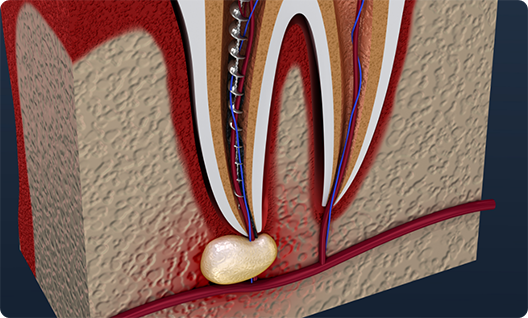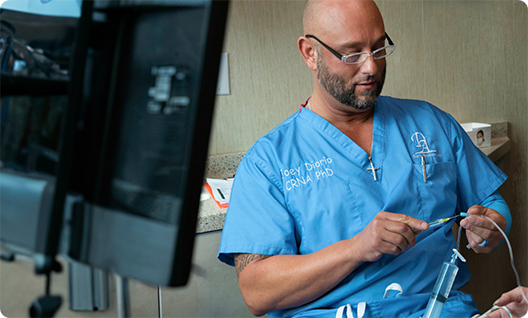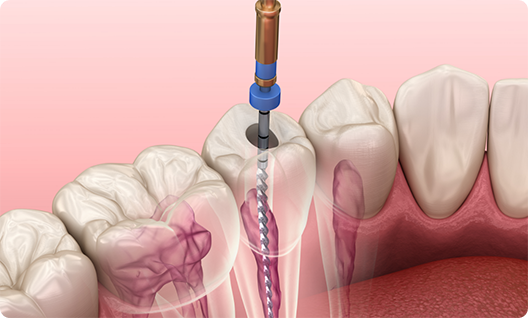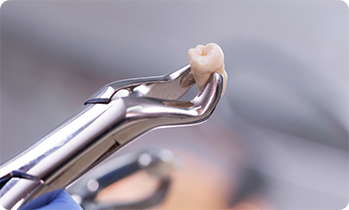@LITTLEROCKFAMILYDENTALCARE
Follow Us On InstagramRoot Canal Treatment Little Rock
We’ll Make the Pain Go Away

In the past, if a person had a terrible toothache, the only solution was to simply remove the tooth, meaning they’d have to go through the hassle and expense of replacing it or deal with an incomplete smile, which can lead to even more oral health issues. Thankfully, we can now save even the most damaged teeth using root canal treatment in Little Rock, AR. If you have a terrible toothache that you want to be stopped right away, this is the best way to do it, and you can get the relief you need by calling Little Rock Family Dental Care today.
Why Choose Little Rock Family Dental Care for Root Canal Treatment?
- Same-Day & After-Hour Emergency Appointments Available
- On-Site Endodontist (Root Canal Specialist)
- Soothing Sedation Dentistry Available
Why You Might Need a Root Canal

Inside every tooth is a collection of soft tissue called the dental pulp, which is made up of various blood vessels as well as a sensitive nerve. If an infection can reach the pulp, this can create quite a toothache. With root canal treatment, we’re able to painlessly remove this damaged pulp and restore the tooth to preserve someone’s oral health. Despite what you may have seen in the media, the procedure itself is virtually painless when performed by our expert endodontist!
Signs or Symptoms of a Root Canal

The most common symptom associated with an individual who needs a root canal is immense pain. As the infection reaches the innermost layer, the pulp, it impacts the nerve center, causing pain to radiate throughout the tooth and mouth.
Other symptoms include:
- Sensitivity to hot or cold beverages or foods
- Tooth discoloration
- Swollen, tender gums
- Difficulty eating or pain when touching the tooth
- A loose tooth
Does a Root Canal Hurt?

There are many misconceptions and myths surrounding root canals. The most common one is that they are extremely painful. This is simply not true. The reason for your discomfort is the infection within your tooth. By moving forward with a root canal, we can eliminate the infection and, as a result, alleviate the pain.
Before undergoing a root canal, your dentist will administer anesthesia to ensure you are completely comfortable throughout the procedure and feeling no pain whatsoever.
Root Canal Process

When preparing for a root canal, you will first receive local anesthesia to numb the tooth and the area around it. Placing a dental dam around the affected tooth, we will enter through the top of your crown to access the pulp and root system. Our team will then begin to clear out the diseased and decayed areas of the tooth, thoroughly cleaning the root canals and removing the infected pulp.
Once all debris is cleared, we will disinfect the tooth using a specialized antibacterial solution before reshaping the canals and filling it with gutta-percha, which is a malleable material that will create a tight seal to protect against reinfection or damage.
It may be necessary for us to fill the entry point of the tooth, so we will use a permanent or temporary filling before bonding it into place and removing the dental dam.
Once the procedure is complete, you will receive detailed instructions as well as antibiotics to take while recovering at home. Once your tooth has properly healed, you will likely receive a dental crown to better protect it from future bacteria that try to re-enter the area.
Post-Op Tips for Root Canal Therapy

To ensure you have a swift and successful recovery, make sure you follow your dentist’s instructions:
- Getting plenty of rest.
- Eating soft foods the first few days after surgery.
- Using an ice pack to reduce swelling. You might consider sleeping with your head slightly elevated the first few nights.
- Not rinsing your mouth for a full 24 hours. After this time, you may gently rinse with warm salt water but do not use mouthwash.
- Avoiding hot foods and beverages.
- Not smoking during the first 48 hours or engaging in strenuous exercise.
- Not drinking alcohol while taking antibiotics or prescribed medications.
Understanding the Cost of Root Canals

If you’re interested in learning more about the cost of root canal treatment, don’t go anywhere – you’re in the right place. At your initial appointment, we will provide you with an estimate and review all of the financial solutions available to ensure you can get the care you need at a price you can afford. Until then, you can read through this next section to learn more general information about the cost.
Factors That Can Affect Root Canal Cost

There are a handful of factors we need to consider when creating your treatment plan, starting with the type of tooth and where it’s located in your mouth. After all, your molars have a more complex anatomy, so they typically require more time to treat. Naturally, the complexity of your case and the restoration needed to protect your treated tooth from harm also need to be factored in. In short, your root canal treatment will be completely tailored to your unique dental needs, so we need to see you for an exam before we can provide you with an accurate estimate of the price.
Is it Cheaper to Pull My Tooth?

Although it may seem like having your tooth extracted would be cheaper, it usually isn’t. In the short term, you need to factor in the cost of replacing your tooth with a dental bridge or implant. In the long term, you need to consider the effects of having a tooth removed, like jawbone loss. That’s why we recommend saving your natural tooth whenever possible – it’s the best choice for your smile and your wallet!
Does Dental Insurance Cover Root Canal Treatment?

It’s very common for dental insurance providers to cover a portion of the cost of root canal treatment, whether it’s the price of the initial emergency exam or the restoration used to cover your treated tooth. So, it’s worth taking the time to familiarize yourself with your coverage. You can do that by reading through the fine print on your plan, calling the helpline on your paperwork, or asking our team for help! We have lots of experience helping our patients understand and maximize their benefits.
Other Options for Making Root Canal Treatment Affordable

If you currently don’t have dental insurance and need root canal treatment, then it’s worth talking to our team about the other financial solutions we offer. Flexible financing is a great example of a way to make this tooth-saving treatment more affordable; all you need to do is pick a payment plan that works best with your monthly budget! We also offer periodic specials, which can help reduce your out-of-pocket expenses as well.
Root Canal FAQs
How do I prepare for a root canal?
Before your root canal, we encourage you to ask any questions you may have. After all, you might have heard some misinformation about the procedure, and we’re happy to set your mind at ease. Other than that, we recommend preparing for your root canal by avoiding smoking beforehand. Nicotine restricts blood flow to your mouth and can result in a longer recovery period. We may also discuss whether you’ll need antibiotics to reduce the risk of infection. Lastly, we typically recommend that you eat a couple of hours before your root canal, since you may not be able to eat comfortably for several hours after the procedure.
Why do I need a root canal if my tooth isn’t bothering me?
Some patients who need root canal treatment may have a toothache that eventually fades away on its own. Some never experience tooth pain at all. However, just because the tooth doesn’t hurt doesn’t mean that no infection is present. The infection may have damaged the tooth’s nerves to the extent that they can no longer register pain. If that is the case, we’ll have to perform a root canal to save the tooth from having to be extracted.
How much do root canals cost?
Keep in mind that a root canal is much less expensive than the cost of extracting and replacing a tooth. The cost of getting a root canal generally depends on the complexity of your case as well as your dental insurance coverage. Most dental insurance policies classify root canal treatment as a major restorative procedure and will cover around 50% of the cost.
Little Rock Family Dental Care is in-network with many dental insurance providers, and we’ll even work with out-of-network plans to save you money. If you need a little extra help with the cost, we can help you apply for a low-to-no-interest loan through our partnership with CareCredit.
How long do root canals take?
The amount of time your procedure will take primarily depends on the location of the tooth being treated in your mouth. In general, teeth toward the back of the mouth take longer to treat because they have more root canals that must be cleaned out. In most cases, a root canal takes somewhere between 30 and 90 minutes.




